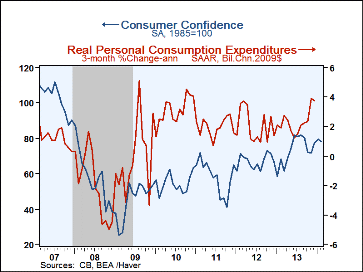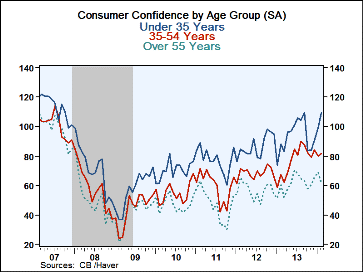 Global| Feb 25 2014
Global| Feb 25 2014U.S. Consumer Confidence Retreats Amongst Individuals Over 55
by:Tom Moeller
|in:Economy in Brief
Summary
Consumer confidence, as measured by the Conference Board, fell to an index reading of 78.1 this month (+14.9% y/y) from January's 79.4, revised down from 80.7. The latest figure fell short of the Action Economics Consensus Forecast [...]
Consumer confidence, as measured by the Conference Board, fell to an index reading of 78.1 this month (+14.9% y/y) from January's 79.4, revised down from 80.7. The latest figure fell short of the Action Economics Consensus Forecast reading of 80.1. During the last ten years there has been a 45% correlation between the level of confidence and the three-month change in real personal consumption expenditures.
By age group, confidence deteriorated amongst individuals over 55 years old. The 10.0% m/m decline (+3.2% y/y) reversed increases during the prior two months. Confidence amongst individuals aged less than 35 years old made up some of this decline with a 10.3% m/m rise (24.7% y/y). Respondents aged 35-54 years old became slightly more confident m/m (20.9% y/y).
The expectations confidence indicator led the overall reading lower with a 6.3% decline (+4.6% y/y) to 75.7. The present situations reading offset some of that downward pressure with a 5.7% rise (33.1% y/y) to 81.7. Business conditions were rated as good by 21.5% of respondents, an expansion high. Only 16.3%, however, thought they would be better in six months, down from 21.4% who thought so in June. Jobs were viewed as hard to get by a steady 32.5% of respondents, an expansion low. Only 13.3% thought that there would be more jobs in six months. A slightly improved 0.9% of respondents expected to buy a new home in six months. Just 45.5% were going to buy a major appliance, the least since early 2012. A very-much improved 5.2% of respondents planned to buy a new automobile within the next six months, the most since 2007. Expectations for the inflation rate held m/m at 5.2%, the lowest reading since late 2010.
The Consumer Confidence data is available in Haver's CBDB database. The total indexes appear in USECON and the market expectations are in AS1REPNA.
Monetary Policy and Financial Stability from Federal Reserve Board Governor Daniel K. Tarullo can be found here.
| Conference Board (SA, 1985=100) | Feb | Jan | Dec | Y/Y % | 2013 | 2012 | 2011 |
|---|---|---|---|---|---|---|---|
| Consumer Confidence Index | 78.1 | 79.4 | 77.5 | 14.9 | 73.2 | 67.1 | 58.1 |
| Present Situation | 81.7 | 77.3 | 75.3 | 33.1 | 67.6 | 49.8 | 36.1 |
| Expectations | 75.7 | 80.8 | 79.0 | 4.6 | 77.0 | 78.6 | 72.8 |
| Consumer Confidence By Age Group | |||||||
| Under 35 Years | 109.5 | 99.3 | 90.8 | 24.7 | 93.1 | 86.5 | 77.3 |
| Aged 35-54 Years | 81.6 | 80.2 | 83.9 | 20.9 | 76.8 | 68.5 | 59.8 |
| Over 55 Years | 62.0 | 68.9 | 65.9 | 3.2 | 61.2 | 56.7 | 47.3 |
Tom Moeller
AuthorMore in Author Profile »Prior to joining Haver Analytics in 2000, Mr. Moeller worked as the Economist at Chancellor Capital Management from 1985 to 1999. There, he developed comprehensive economic forecasts and interpreted economic data for equity and fixed income portfolio managers. Also at Chancellor, Mr. Moeller worked as an equity analyst and was responsible for researching and rating companies in the economically sensitive automobile and housing industries for investment in Chancellor’s equity portfolio. Prior to joining Chancellor, Mr. Moeller was an Economist at Citibank from 1979 to 1984. He also analyzed pricing behavior in the metals industry for the Council on Wage and Price Stability in Washington, D.C. In 1999, Mr. Moeller received the award for most accurate forecast from the Forecasters' Club of New York. From 1990 to 1992 he was President of the New York Association for Business Economists. Mr. Moeller earned an M.B.A. in Finance from Fordham University, where he graduated in 1987. He holds a Bachelor of Arts in Economics from George Washington University.
More Economy in Brief
 Global| Feb 05 2026
Global| Feb 05 2026Charts of the Week: Balanced Policy, Resilient Data and AI Narratives
by:Andrew Cates










